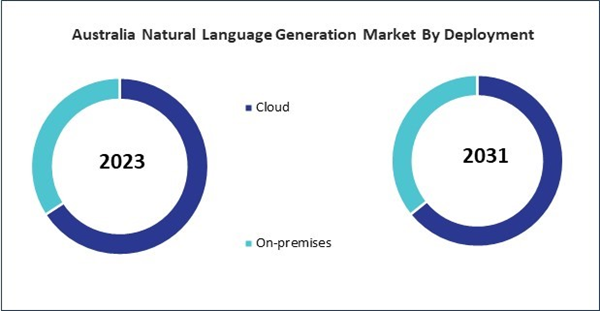The China market dominated the Asia Pacific Natural Language Generation Market by Country in 2023, and is expected to continue to be a dominant market till 2031; thereby, achieving a market value of USD220.2 million by 2031. The Japan market is registering a CAGR of 21.1% during 2024-2031. Additionally, the India market would showcase a CAGR of 22.7% during 2024-2031.
Several factors have fueled the adoption of NLG technology. For instance, NLG solutions allow businesses to scale content generation quickly without a corresponding increase in workforce. This is particularly valuable for companies requiring large reports, articles, or personalized communications. The need for real-time content generation, especially in sectors like finance and news media, drives the adoption of NLG. Organizations can respond instantly to market changes or breaking news, maintaining competitiveness.
NLG minimizes human error in content generation, particularly in data-intensive fields such as finance and healthcare. By relying on structured data, NLG ensures that reports and summaries are accurate and consistent. Many modern NLG tools come with intuitive interfaces that allow non-technical users to create and customize content easily. This democratizes access to NLG technology across various organizational levels.
India's rising banking, financial services, and insurance (BFSI) industry significantly influences this market, driven by the sector’s rapid expansion and increased accessibility. According to the Investment Promotion and Facilitation Agency, India boasts one of the world’s most stable banking sectors. Between FY 2016 and FY 2021, the percentage of individuals with bank accounts surged from 53% to 78%. This growth reflects increased financial inclusion and a burgeoning demand for efficient communication and reporting tools within the BFSI sector.
China's increasing digital economy profoundly impacts this market, driven by significant growth potential and strategic government initiatives. According to the State Council of the People’s Republic of China, the digital economy has expanded rapidly, contributing to the country’s aim for high-quality development. In conclusion, the rising BFSI industry in India and the expansion of the digital economy in China are significantly shaping the natural language generation market.
Based on Enterprise Size, the market is segmented into Large Enterprise and Small & Medium Enterprise (SME). Based on Application, the market is segmented into Risk & Compliance Management, Customer Experience Management, Fraud Detection & Anti-Money Laundering (AML), Predictive Maintenance, Performance Management, and Other Application. Based on Solutions, the market is segmented into Software and Service. Based on Deployment, the market is segmented into Cloud and On-premises.
List of Key Companies Profiled
- IBM Corporation
- Microsoft Corporation
- Google LLC (Alphabet Inc.)
- Amazon Web Services, Inc. (Amazon.com, Inc.)
- SAS Institute Inc.
- Salesforce, Inc.
- Arria NLG Limited
- vPhrase
- Retresco GmbH
- Yseop
Market Report Segmentation
By Enterprise Size
- Large Enterprise
- Small & Medium Enterprise (SME)
By Application
- Risk & Compliance Management
- Customer Experience Management
- Fraud Detection & Anti-Money Laundering (AML)
- Predictive Maintenance
- Performance Management
- Other Application
By Solutions
- Software
- Service
By Deployment
- Cloud
- On-premises
By Vertical
- Banking, Financial Services & Insurance
- Manufacturing
- Retail & Ecommerce
- Government & Defense
- Telecom & IT
- Healthcare & Lifesciences
- Energy & Utilities
- Media & Entertainment
- Other Vertical
By Country
- China
- Japan
- India
- South Korea
- Australia
- Malaysia
- Rest of Asia Pacific
Table of Contents
Companies Mentioned
Some of the key companies in the Asia-Pacific Natural Language Generation Market include:- IBM Corporation
- Microsoft Corporation
- Google LLC (Alphabet Inc.)
- Amazon Web Services, Inc. (Amazon.com, Inc.)
- SAS Institute Inc.
- Salesforce, Inc.
- Arria NLG Limited
- vPhrase
- Retresco GmbH
- Yseop









